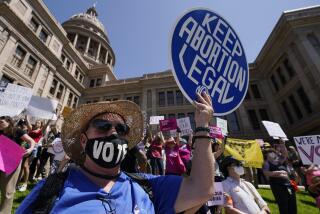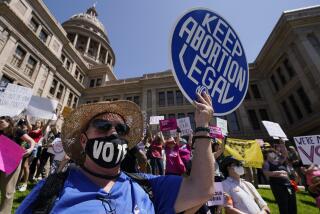Sterilization Ruled Basis for Asylum
- Share via
A woman who was compelled to abort two pregnancies in China is entitled to political asylum in the United States because of the likelihood that she would be persecuted, sterilized and imprisoned if she were forced to return, a federal appeals court ruled Friday.
In a 3-0 decision, the U.S. 9th Circuit Court of Appeals in San Francisco reversed a decision by the Board of Immigration Appeals denying asylum to Xuan Wang of Montebello.
Wang “has shown a genuine and well-founded fear of future persecution, should she return to China,” 9th Circuit Judge Betty B. Fletcher wrote.
A 1996 federal law “provides that forced abortions are per se persecution and trigger asylum eligibility,” Fletcher wrote.
Since 1981, China has enforced a strict policy limiting families to one child, enforced with abortions, sterilizations and IUD insertions. Millions of the procedures are performed annually, many under duress, according to congressional testimony.
In 1996, Congress passed a bill granting refugee status to 1,000 people a year if they can prove that their country forced population control on them. The Immigration and Naturalization Service, now the Bureau of Citizenship and Immigration Services, has rejected a number of asylum claims since then, saying the applicants had failed to prove their cases, according to immigration law experts.
The 9th Circuit found that Wang had established eligibility for asylum because she had provided specific evidence that she had been ordered to abort two pregnancies after having her first child and because she had been the subject of a pending sterilization order when she left China.
Wang had her first child in 1994 and was to receive an IUD six months later. But she became pregnant in five months. The hospital notified family planning officers at her workplace, who forced her to get an abortion “by reducing her wages and threatening to fire her” if she did not comply, the court said in Friday’s ruling.
Months later, Wang became pregnant again and local officials warned that she and her husband would be severely penalized if she gave birth. She submitted to another abortion.
Wang came to the U.S. and applied for asylum under the Convention Against Torture and Other Cruel, Inhuman or Degrading Treatment or Punishment. A Los Angeles Immigration judge rejected her request in April 1999 and ordered her removed to China, concluding that she lacked credibility. The judge said Wang and her husband had made inconsistent statements about the dates and circumstances of the abortions.
The Board of Immigration Appeals upheld that ruling and Wang appealed to the 9th Circuit.
“Wang was persecuted for not abiding by China’s one-child policy,” Fletcher wrote.
“Wang provided testimony and corroborating medical records that she was subject to two forced abortions,” he wrote.
The judge said the immigration agency had “presented no evidence” to rebut the presumption that Wang would be persecuted if she returned to China.
Fletcher said discrepancies in testimony by Wang and her husband could not be viewed as attempts to enhance claims of persecution and therefore had no bearing on her credibility.
Fletcher also expressed astonishment at what justice department lawyers had said about contradictory rulings by immigration judges. After Wang was denied asylum, another immigration judge granted asylum to her husband, Ming Wang, on the basis of her forced abortions.
A lawyer for the immigration agency told the 9th Circuit that it should not be concerned about the inconsistent rulings and that the agency had no need to reconcile them. “We wonder how any rational system could tolerate such inconsistent treatment,” Fletcher wrote.
Xuan Wang’s attorney, Judith L. Wood of Los Angeles, said, “I’m very happy. Justice was done.”
She said the case had been a lamentable example of an immigration judge “denigrating stories of people who have suffered terrible tragedies in their home countries with some little hair-splitting detail.”
A Justice Department spokesman said the government had no immediate comment.
More to Read
Sign up for Essential California
The most important California stories and recommendations in your inbox every morning.
You may occasionally receive promotional content from the Los Angeles Times.












